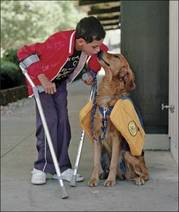BLOG
By Ivette Machado and Caridad Rusconi
A recent article by The Miami Herald about individuals who get phony credentials for service animals illustrates some of the troublesome and divisive issues that these animals present for condominium associations and HOAs. Most recently, the community association lawyers at our firm as well as throughout the country are being asked by many of their clients about the impact of recent changes to the American with Disability Act (“ADA”). One of the most common questions has been whether the changes in the ADA’s definition of “service animal” will impact the policies of community associations. After a careful review and analysis of the matter, our attorneys are advising our association clients that the change appears to be inapplicable to them.
The change in the ADA’s definition of “service animal” that is causing the most confusion among community associations is the new stipulation in the definition which reads: “The crime deterrent effects of an animal’s presence and the provision of emotional support, well-being, comfort, or companionship do not constitute work or tasks for the purposes of this definition.” In other words, the provision of emotional support, well-being, comfort or companionship by an animal does not constitute work or tasks for the purposes of the definition of a service animal under the ADA.
 This change in the ADA’s definition of service animal seemingly empowers a community association to turn down a request to maintain an emotional support or companionship animal as a reasonable accommodation to an individual’s disability. However, this amendment to the definition of a service animal under the ADA does not alter an association’s obligation to grant a reasonable accommodation request under the Fair Housing Act (“FHA”). In that regard, the U.S. Department of Housing and Urban Development (“HUD”) issued a memorandum on February 17, 2011, regarding “New ADA Regulations and Assistance Animals as Reasonable Accommodations under the Fair Housing Act and Section 504 of the Rehabilitation Act,” which reads:
This change in the ADA’s definition of service animal seemingly empowers a community association to turn down a request to maintain an emotional support or companionship animal as a reasonable accommodation to an individual’s disability. However, this amendment to the definition of a service animal under the ADA does not alter an association’s obligation to grant a reasonable accommodation request under the Fair Housing Act (“FHA”). In that regard, the U.S. Department of Housing and Urban Development (“HUD”) issued a memorandum on February 17, 2011, regarding “New ADA Regulations and Assistance Animals as Reasonable Accommodations under the Fair Housing Act and Section 504 of the Rehabilitation Act,” which reads:
“The ADA regulations’ revised definition of “service animal” does not apply to reasonable accommodation requests for assistance animals in housing under either the FHAct [(i.e., FHA)] or Section 504. Rules, policies or practices must be modified to permit the use of an assistance animal as a reasonable accommodation in housing when its use may be necessary to afford a person with disabilities an equal opportunity to use and enjoy a dwelling, common areas of a dwelling . . .” It further states: “Neither the FHAct, Section 504, nor HUD’s implementing regulations contain a specific definition of the term ‘service animal.’ However, species other than dogs, with or without training, and animals that provide emotional support have been recognized as necessary assistance animals under the reasonable accommodation provisions of the FHAct and Section 504 . . .”
Finally, the Federal Register further provides that an individual’s rights under the FHA are not affected by the amendment to the ADA. In that regard, 75 Fed. Reg. 56194 provides as follows:
“This decision does not have any effect on the extent to which public entities are required to allow the use of [capuchin] monkeys under other Federal statutes. For example, under the FHAct, an individual with a disability may have the right to have an animal other than a dog in his or her home if the animal qualifies as a reasonable accommodation that is necessary to afford the individual equal opportunity to use and enjoy a dwelling, assuming that that the use of the animal does not post a direct threat.”x
The Federal Register further stipulates:
“. . . [E]motional support animals that do not qualify as service animals under the Department’s title II regulation may nevertheless qualify as permitted reasonable accommodations under the FHAct and the ACAA.”
Based on these facts, it is the position of the DOJ and HUD that the recent amendment to the ADA re-defining “service animals” to exclude emotional support animals is likely to be inapplicable to many issues confronting community associations. Our attorneys will continue to monitor and write about important issues affecting community associations in this blog, and we encourage association members, directors and property managers to submit their e-mail address in the box on the right in order to automatically receive all of our future blog posts.



